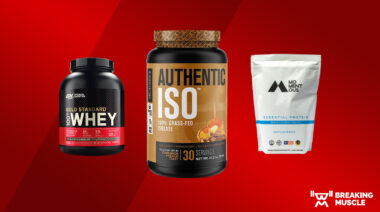Healthy fats are an important part of a diet that luckily has gained mainstream attention as opposed to the no-fat diets of a decade ago. The paleo diet, for example, is one focusing on healthy fats and a lot of protein. A vegetarian diet, by contrast, often focuses on consuming healthy fats, but is frequently lower in protein. Advocates of either lifestyle can sometimes be heard debating the merits of high or low protein consumption.
If you’re unfamiliar with each position, some people believe that high protein consumption is hard on the digestive system and perhaps unnecessary for athletes. By contrast, people looking to gain strength or build muscle claim that a high protein diet is required, and that such a diet is not as unhealthy as detractors claim. Protein is also the most thermic of the macronutrients, meaning it requires the most calories for digestion. Even amongst athletes there is debate about what is healthy.
A study this month in the Nutrition Journal compared low-fat diets associated with various amounts of protein. The researchers sought to answer the very question of whether high protein consumption was a benefit or a detriment to health. One thing is certain, protein is needed to build and repair muscle and for countless other processes of the body. However, we don’t want to eat so much to become unhealthy, so the researchers examined numerous studies to find a consensus. They looked at resulting body fat, blood pressure, cholesterol, insulin response, and cardiovascular risk factors.
Researchers called any diet with greater than 25% energy content from protein to be a high-protein diet and any with less than 20% to be a low-protein diet. On a 2000 calorie per day diet, that amounts to greater than 125 grams or less than 100 grams respectively. The recommendations for many weight lifters, especially those looking to gain lean muscle mass, typically fall within the high-protein diet side of this study.
What researchers ultimately found was that the high-protein diet was healthier. Most of the scores were the same between the two, with two important exceptions. The high-protein group had better fasting insulin, which means they probably had better control of their blood sugar. The high-protein group in some studies also had improved HDL cholesterol. All the other factors, like body fat level, were the same between groups.
So for athletes who had been worried about high protein diets, worry no longer. If anything it will make you healthier. One thing not present in this analysis was the effect on athletes. The extra muscle mass from exercise and protein consumption would make the difference in body fat and other factors not noted here. If all the extra protein is utilized for activity, then I suspect the health benefits of a high protein diet will be even more pronounced.
References:
1. Lukas Schwingshackl, et. al., “Long-term effects of low-fat diets either low or high in protein on cardiovascular and metabolic risk factors: a systematic review and meta-analysis,” Nutrition Journal 2013, 12:48.
Photo courtesy of Shutterstock.






